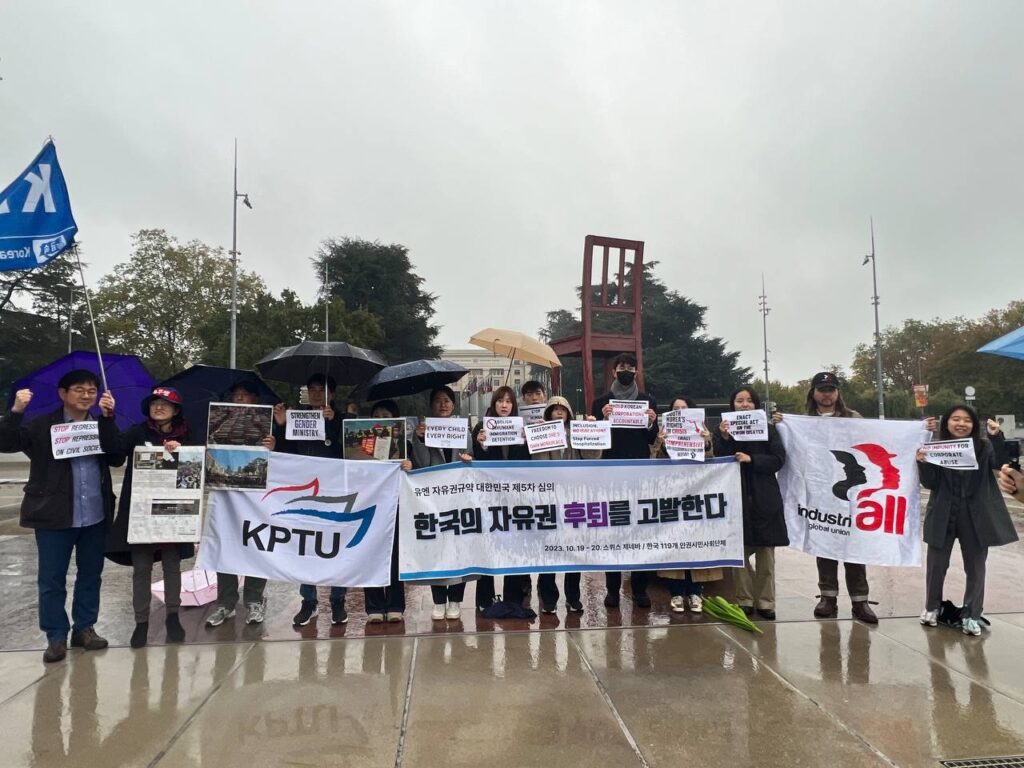24 October, 2023South Korean trade unions and civil society organizations, including IndustriALL Global Union affiliate the Korean Metal Workers’ Union, demonstrated at the Broken Chair in Geneva last week before making a submission at the UN Human Rights Committee.
The government of Korea is being challenged under the International Covenant on Civil and Political Rights (ICCPR), a multilateral treaty that commits countries to respect civil and political rights. The unions made a submission to the 139th Session of the Human Rights Committee on the Fifth Periodic Report of the Republic of Korea, alleging that restrictive labour laws, limitations on the right to strike, and numerous violations of freedom of association were contrary to Korea’s commitments under the treaty.
The fourth review of Korea, carried out in 2015, found “unreasonable restrictions” placed on freedom of association, and recommended that the government of Korea ensure the right to peaceful assembly. However, the government has done little to ensure that its legal framework complies the international labour standards enshrined in articles 21 and 22 of the ICCPR, as well as ILO Conventions 87 and 98.
In theory, workers in Korea have the right to organize, collective bargaining and collective action enshrined in the Constitution. But in reality, the provisions of the Trade Union and Labour Relations Adjustment Act (TULRAA) severely restrict workers’ rights. The act makes it almost impossible for workers to take legal strike action, and if they break the law, they can be sued by the company for damages, and by the state for the cost of policing the strike.
In sectors such as steel and shipbuilding, 70-80 per cent of workers are subcontracted, and the Act’s definition of “employer” makes it impossible for subcontracted workers to bargain with the principal employer. For instance, Daewoo Shipbuilding (DSME) has more than 100 subcontractors within one shipyard. When workers struck in 2022 to reverse a 30 per cent wage cut introduced by DSME during the pandemic, the company refused to negotiate, saying it was not party to the dispute. However, subcontractors could not address workers’ demands, because the wages had been set by DSME.
The striking workers were violently attacked, and after the 51-day strike ended, the union leaders were sued for EUR 32.3 million of damages due to lost production targets.
There are currently around 30 Korean trade unionists in prison for union activity.
The union delegation was supported by legal experts from the ITUC, who made a written submission (link) to the Committee. The unions cited a number of cases of violent repression and malicious lawsuits as evidence, and asked the Human Rights Committee to call on the government of Korea to cease its anti-union activities and to bring its legal framework into alignment with international labour standards.
IndustriALL assistant general secretary Christina Olivier said:
“The government of Korea violates workers’ rights to organize, to peaceful assembly, and to take strike action. Trade unionists are beaten up, sued and imprisoned for carrying out union activity. IndustriALL stands in solidarity with our brothers and sisters in their demand that the UN Human Rights Committee hold the Republic of Korea to account. Korea is a party to the ICCPR and must uphold its obligations.”
